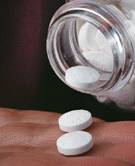What causes aspirin resistance isn’t known
TUESDAY, Feb. 24, 2015 (HealthDay News) — People who are resistant to aspirin may be at risk for larger, more severe strokes, researchers report. The study was released Feb. 23, ahead of its official presentation at the annual meeting of the American Academy of Neurology, to be held from April 18 to 25 in Washington, D.C.
“Aspirin resistance is an important predictor of severe stroke and large stroke size in patients taking aspirin before having a stroke,” lead researcher Mi Sun Oh, M.D., of the department of neurology at the Hallym University College of Medicine in Seoul, South Korea, told HealthDay. “In patients at high risk for stroke with aspirin resistance, different anti-clotting drugs — such as clopidogrel (Plavix) — can be considered as alternatives to prevent another stroke or decrease stroke severity.”
For the study, Oh and colleagues studied 310 patients who had been taking aspirin for at least seven days before they suffered an ischemic stroke. Aspirin resistance was checked within 24 hours of hospital admission.
The researchers found that 27.7 percent of the patients were resistant to aspirin. Their strokes ranged from 3 to 11 on a stroke severity score, compared with scores of 1 to 6 among aspirin responders. Moreover, strokes of patients resistant to aspirin affected about twice the brain area as the strokes of those who responded to aspirin.
Copyright © 2015 HealthDay. All rights reserved.








